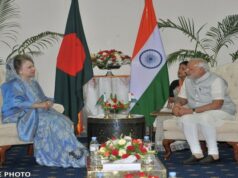Thousands of people gathered outside Taiwan’s parliament on Tuesday to protest a newly passed reform package aimed at increasing government oversight. The reform, driven by the opposition, faced resistance from the ruling party which lacked the votes to prevent its passage. The protests have remained mostly peaceful though there have been some violent confrontations within parliament.
These events are occurring amidst broader concerns over China’s attempts to influence Taiwan’s politics. China, which considers Taiwan part of its territory, has been a persistent background factor in the island’s political dynamics.
The Democratic Progressive Party’s (DPP) Lai Ching-te won presidency in January elections but doesn’t have a majority in parliament. Taiwan’s main opposition party, the Kuomintang (KMT), along with the small Taiwan People’s Party, together have the most seats.
The parliament reforms give lawmakers the power to ask the military, private companies or individuals to disclose information deemed relevant by parliamentarians.
They also criminalise contempt of parliament by government officials and require the president to give regular reports to parliament and answer lawmakers’ questions, which would be a first for Taiwan.
The DPP says the reforms were forced through without proper consultation and their content either vague or an overreach of power. On Tuesday its lawmakers threw garbage bags and paper planes at their Opposition counterparts.
“You can seize parliament but you cannot seize public opinion,” DPP parliament leader Ker Chien-ming said in an address to the chamber, adding that Beijing had influenced Taiwanese politics.
Opposition lawmakers, holding sun-shaped balloons, shouted “let sunlight into parliament”. Both parties covered the chamber with banners.
The KMT has denounced the DPP for trying to “paint them red”, the colour of China’s Communist Party, and says the DPP is trying to stymie efforts to investigate corruption cases and sow unfounded fears about the reforms.
Outside parliament, protesters showed their anger at the reforms and also shouted “refuse Chinese political interference”, among other slogans.
“This is the people’s voice,” said Zheng Hung-gun, 33, who works in the food industry. “Taiwanese are not afraid of enemies from outside but we are worried about our internal enemies.”
Last week, tens of thousands thronged the roads around parliament protesting the reforms.
Several senior KMT leaders have visited China this year, in what the party says is an effort to keep lines of communication open. It denies being pro-Beijing.
China refuses to speak to Lai or the DPP, saying they are “separatists”. Lai says only Taiwan’s people can decide their future and has repeatedly offered talks with China, but been rebuffed.
With Inputs From Reuters
Research Associate at StratNewsGlobal, A keen observer of #China and Foreign Affairs. Writer, Weibo Trends, Analyst.
Twitter: @resham_sng




